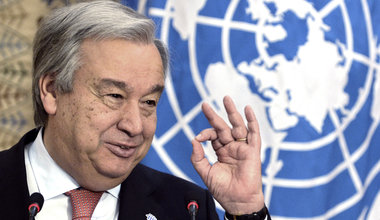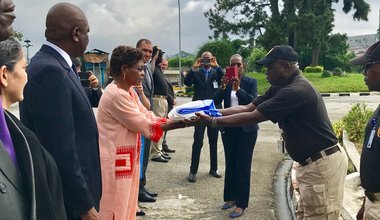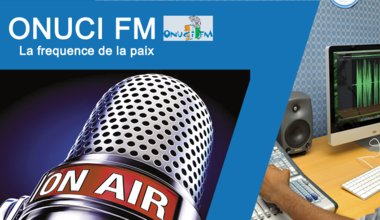International press review, 8 June 2009
L'ONUCI
va aider à la sécurisation de la présidentielle ivoirienne, Panapress New York,
4 juin 2009-
La Mission de maintien de la paix de l'ONU en Côte d'Ivoire
(ONUCI) va travailler avec les autorités ivoiriennes pour déployer des unités
mixtes composées d'anciens rebelles et de militaires de l'armée nationale pour
assurer la sécurité durant l'élection présidentielle prévue le 29 novembre
prochain (....)
COTE D'IVOIRE:
Crisis runs deeper than elections, Irinnews, 4 June 2009-
The
crisis in Côte d'Ivoire is deeper than elections," according to Patrick N'Gouan,
national coordinator of a civil society coalition. "Too many people do not eat
their fill, cannot educate their children and cannot access health care. All the
social and economic indicators have plummeted... We cannot solve all of Côte
d'Ivoire's problems with just politics – and yet this has been the focus of
everyone's energy and resources for the past few years. Meanwhile the people
have been sacrificed," N'Gouan told IRIN on 2 June. The civil society coalition
wrapped up a week of consultations – 22 to 29 May – on issues from religious
tolerance to girls' education to the public debt. It brought together
representatives of the government, political parties, local and international
NGOs, think-tanks, donors, the UN and the diplomatic community (...) Slightly
under 49 percent of Ivoirians are poor (living on less than US$1.35 a day) – up
from 38.4 percent in 2002 and nearly five times higher than in 1985, according
to government statistics. World Bank and International Monetary Fund officials
in a
recent paper
said they
believe it will be "very difficult" for Côte d'Ivoire to meet the Millennium
Development Goal of halving poverty – from the benchmark 1990 level of 24
percent – by 2015 (..._) Several participants at the recent consultations told
IRIN civil society groups had an important role in the country's comeback. "For
a time we allowed just politicians to work [on the issues affecting our
country]," said Nana Dodo, head of Côte d'Ivoire's royalty and traditional
chiefs. "But with these [meetings] we have seen civil society mobilize and go to
work to rebuild the country."
Philippe
Légré, head of the opposition party Mouvement des Forces d'Avenir, said the
consultations were like a pressure valve. "These 'consensus days' allowed us to
raise all the troubles Côte d'Ivoire is facing and to propose solutions from
which future leaders can be guided and inspired."
He
added: "Civil society must realize that politicians are not the enemy; at the
same time, politicians must not have a negative view of civil society." (...)"If
the election [scheduled for 29 November] for whatever reason is postponed again
it will threaten the [Ouagadougou] political agreement, which has allowed for
the current peaceful environment," said Rinaldo Depagne, senior West Africa
analyst with the International Crisis Group. "If the election takes place it
will be a major step to the end to the crisis, but just one step. There is a
long way to go to restore stability even after an election." The current
government of President Laurent Gbagbo and rebel leader turned Prime Minister
Guillaume Soro – formed as part of the March 2007
Ouagadougou peace accord
– was to have led a return to stability and hold a presidential election within
10 months.
Cacao
ivoirien: appel à la libération des dirigeants incarcérés depuis un an, AFP, 6
juin 2009-
Un millier de personnes ont manifesté samedi à
Abidjan pour demander la "mise en liberté provisoire" des dirigeants de la
filière cacao ivoirienne incarcérés depuis juin 2008 pour de présumées
malversations, sans avoir été jugés, a constaté un journaliste de l'AFP.
Ces manifestants, pour la plupart des proches des responsables emprisonnés,
se sont rassemblés sur une place du quartier populaire de Yopougon pour
"demander publiquement pardon" au président ivoirien Laurent Gbagbo.
"Nous demandons la clémence du chef de l'Etat, président du Conseil
supérieur de la magistrature. A ce titre, il peut s'auto-saisir pour la mise
en liberté provisoire des 24 personnes incarcérées", a expliqué à l'AFP Marius
Bohui, initiateur de cette manifestation, à laquelle participaient des chefs
coutumiers et religieux."Nous estimons qu'un an sans jugement, c'est trop", a
lancé un participant. Parmi les responsables incarcérés figurent Henri Amouzou,
président du Fonds de développement pour les producteurs du café-cacao (FDPCC),
et Angeline Kili, présidente du Conseil d'administration du Fonds de régulation
du cacao (FRC).M. Amouzou et Mme Kili ont été arrêtés en juin 2008,
 ONU
ONU Nations Unies Maintien de la paix
Nations Unies Maintien de la paix



